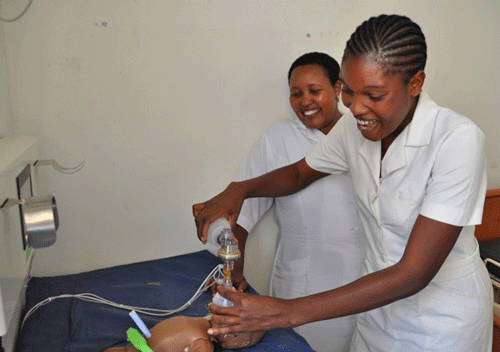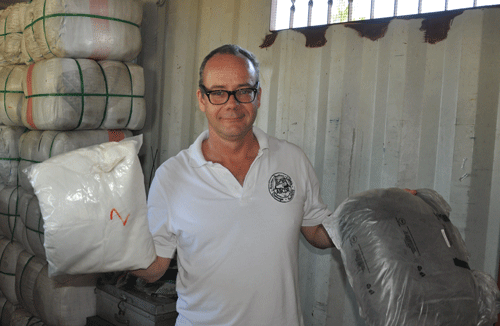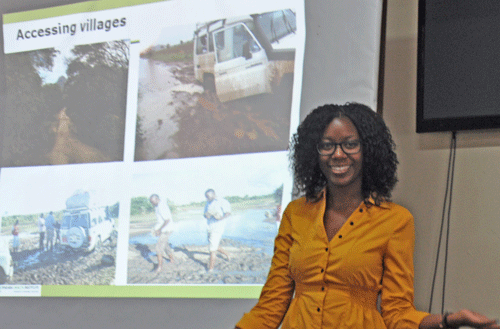Better health for the poorest segments

The Research Council's Programme for Global Health and Vaccination Research (GLOBVAC) can help more newborn children to survive and reduce the number of deaths from malaria. The Research Council of Norway recently visited Tanzania to see some of the GLOBVAC projects first-hand.
Each year, the GLOBVAC research programme awards approximately NOK 122 million in funding to research seeking to improve health for poor people in low- and lower-middle income countries. NOK 112 million is allocated from the Norwegian Agency for Development Cooperation (Norad) and NOK 10 million from the Ministry of Health and Care Services. Recent years have seen sharp growth in the budgetary framework for the programme, as well as the number of projects funded and grant applications received under the programme. The GLOBVAC programme is now the largest health programme under the Research Council.
Helping newborns to breathe
Approximately 3.5 million newborn babies die throughout the world each year, with most deaths occurring in resource-poor countries. Data show that around 16 per cent of newborn infants do not begin to breathe on their own. Many of these babies will die or sustain serious damage without immediate assistance.
Haydom Lutheran Hospital is located in a remote area of Tanzania. Midwives working in the hospital's delivery rooms are instructed in how to use newly developed equipment designed to help newborns struggling to breathe. This equipment was developed and is being implemented as part of the Safer Births innovation project carried out by Laerdal Global Health AS, partially funded under the GLOBVAC programme.
Critical minutes
The likelihood of death or infirmity increases significantly for every minute a baby goes without breathing on its own or with ventilation after birth, says project manager Hege Ersdal, who is also an anaesthesiologist at Helse Stavanger Hospital.
"Simple measures in conjunction with childbirth can save many lives. For these measures to have an effect on early newborn mortality globally, they must be adapted to resource-limited circumstances, and they must be robust and cheap so that they can be implemented anywhere in the world."
"Monitoring foetal sounds makes it possible to identify those who are in need of help. Most newborns that fail to breathe on their own can be saved by stimulating breathing immediately or applying a bag/mask ventilator," Dr Ersdal explains.

In addition to developing the equipment to save newborns, the researchers have designed a course for the health care personnel who will be using it. They are also analysing health data on children born at the hospital.
The project is part of "Helping Babies Breathe" (HBB), an international evidence-based educational programme for health care personnel. The objective of the programme is to reduce early newborn mortality.
One study from eight hospitals in Tanzania shows that the number of infants who die during birth drops by nearly half (from 1.3 per cent to 0.7 per cent) when health care personnel are trained in the HBB programme and use its techniques. "This programme can be of great help in reducing early newborn mortality," Hege Ersdal says.
Advice to Tanzania on mosquito nets
The objective of the GLOBVAC-funded project, The useful life of bednets, is to provide authorities in Tanzania with information about which mosquito nets work best and how often to replace them.
As part of the study, researchers have set up three different types of mosquito nets in over 3 000 households in a total of eight districts in Tanzania to find out which net provides the best protection. This is one of the world's largest studies on mosquito nets.
Some are sceptical
"Getting around in Tanzania can be very difficult and it takes a lot of preparation before we can set up mosquito nets in family homes in remote areas," says Zawadi Mageni, one of the Tanzanian doctoral fellows participating in the project.

"Some people are sceptical and some have thought we were members of a cult and were trying to convert them. So we have to meet with the heads of the villages ahead of time and encourage them to convince the people that this is research that will benefit them," Ms Mageni explains.
Bednets are an important means of controlling malaria, but there is little research-based knowledge on nets or how effective they are. Hans J. Overgaard at the Norwegian University of Life Sciences (NMBU) is heading the project in close cooperation with the National Malaria Control Programme in Tanzania.
"The results will show which mosquito nets provide the best protection and also how long a net remains effective. The Tanzanian authorities and WHO are very interested in following up on the project's findings," Mr Overgaard says.
"Impressed with the research and the facilities"
Representatives of the GLOBVAC research programme visited Tanzania recently to learn more about the projects and their local partners. Project management responsibilities are often divided between a Norwegian and a Tanzanian project manager.
"These are very complex research projects with field studies in locations ranging from delivery rooms to mosquito-research laboratories. The researchers involved in the projects have very diverse backgrounds and we are impressed with both the quality of their research and their facilities, like the one in Haydom, which is a really remote location. It's also fascinating to see how they solve difficult logistics challenges," says programme coordinator Åse-Marit Kristiansen.
"One unique feature of the GLOBVAC programme is that most of the projects involve partners from 3–4 low- and lower-middle income countries and require a project manager from a Norwegian institution. The projects have an international scope and tend to be highly complex. The field studies often take place in difficult conditions in low-income countries," Ms Kristiansen states.


















